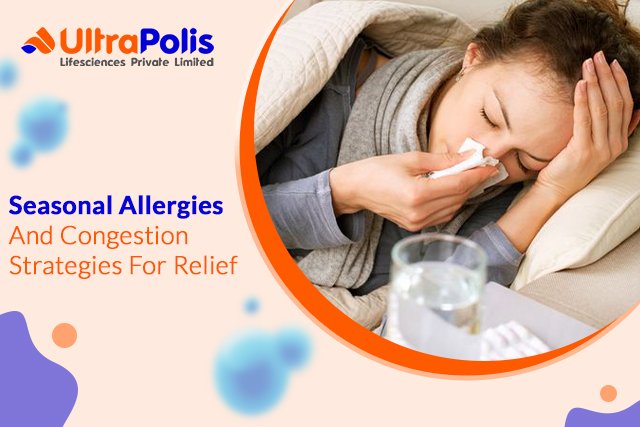
Allergies and Congestion: Strategies for Relief
Just as the seasonschange, we welcome seasonal allergies. Often known as hay fever or allergic rhinitis, can bring unpleasant symptoms like sneezing, stuffy or runny noses, itchy eyes, and more. These symptoms can make it hard to enjoy the beautiful weather and the great outdoors. Seasonal allergies happen when your body overreacts to harmless substances in the air. These substances, called allergens, can be pollen from trees, grasses, and weeds, or even mold spores. When you breathe in these allergens, your body’s defense system, known as the immune system, thinks they are harmful invaders and releases chemicals like histamine to fight them off. This is when you start to experience those annoying allergy symptoms.
Common Symptoms
The symptoms of seasonal allergies can vary from person to person, but some of the most common ones include:
Sneezing: Allergies can make you sneeze frequently, which can be quite bothersome.
Runny or Stuffy Nose: Many people experience a runny or stuffy nose, which can make breathing difficult.
Itchy or Watery Eyes: Your eyes might become itchy and red, and you may even experience excessive tearing.
Scratchy Throat: Some people also get a scratchy or sore throat.
Coughing: Allergies can lead to coughing, especially if the postnasal drip irritates your throat.
Fatigue: Dealing with allergies can be tiring, and you may feel fatigued.
Headaches: Some individuals may also experience headaches due to their allergies.
What Causes Seasonal Allergies?
Pollen: Trees, grasses, and weeds release tiny grains of pollen into the air to fertilize other plants. When you breathe in this pollen, it can trigger allergies.
Mold Spores: Mold grows both outdoors and indoors. When mold spores become airborne, they can also cause allergy symptoms.
Outdoor Allergens: Besides pollen and mold, outdoor allergens like dust mites and insect droppings can exacerbate your allergies.
Relief
Stay Informed: Keep an eye on pollen and mold counts in your area. You can usually find this information online or through weather apps. On days when the counts are high, try to limit your outdoor activities.
Close Windows: On high pollen days, keep your windows and doors closed to prevent allergens from entering your home.
Use Air Filters: Consider using high-efficiency particulate air (HEPA) filters in your home’s heating and cooling systems to trap allergens and keep the air clean.
Shower and Change: After spending time outdoors, take a shower and change your clothes to remove any pollen or allergens that may have clung to you.
Over-the-counter medications: Antihistamines, decongestants, and nasal corticosteroids available at drugstores can help relieve allergy symptoms. Be sure to follow the instructions and consult with a professional if needed.
Allergy Shots: For severe allergies that don’t respond well to other treatments, allergists can provide immunotherapy or allergy shots. These shots help your body become less sensitive to allergens over time.
Natural Remedies: Some people find relief from their allergies by using natural remedies such as saline nasal sprays, honey, or herbal teas. While these can be helpful, it’s essential to consult with a doctor before trying any natural remedies.
Avoid Triggers: If you know you’re allergic to specific plants or trees, try to avoid them. If you love gardening, wear a mask to limit your exposure to allergens.
Seasonal allergies can be a real nuisance, but with the right strategies, you can find relief and still enjoy the beauty of spring and summer. By following these simple steps, you can make the most of the season without the sniffles and sneezes.
